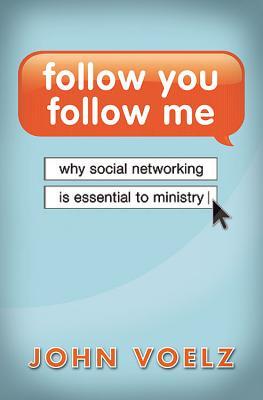Should Christians tweet in church? Catholics would respond with a quick and emphatic “no,” but for many Protestants the question is hotly debated. On the one hand, tweeting encourages participation and discussion. It gives worshipers a chance to engage rather than sit passively. On the other hand, tweeting in church can easily become a frivolous distraction that would better take place outside the sanctuary.
 As several congregations wrestle with the question, one Evangelical pastor has made up his mind. John Voelz is clearly on the pro-Twitter side and his new book, Follow You, Follow Me: Why Social Networking is Essential to Ministry (Abingdon Press, paperback, 160 pages), describes several ways his church has integrated social media.
As several congregations wrestle with the question, one Evangelical pastor has made up his mind. John Voelz is clearly on the pro-Twitter side and his new book, Follow You, Follow Me: Why Social Networking is Essential to Ministry (Abingdon Press, paperback, 160 pages), describes several ways his church has integrated social media.
Some ideas are fresh and innovative, like inviting people to tweet their favorite worship songs before or after the service. The songs voted highest are then sung during next week’s worship.
But other techniques are more controversial. For instance, Voelz’s community regularly celebrates “Cyberconfession,” during which they set up computer stations around the Church, each connected to a private Yahoo! chat group. Penitents log-in anonymously as “Confessor 1”, “Confessor 2”, and so on, then confess their sins digitally to pastors, counselors, and ministry leaders all around the world. After confessing, the penitents receive personalized, digital advice and the message, “God forgives.”
This casual disembodiment of a serious and physical sacrament is typical of Voelz’s progressive approach toward technology. In his words:
“Social networking in church is only out of line if it is understood that it has no place there.”
That’s another way of saying social media is acceptable in church so long as we say it’s acceptable in church. Paving the way for unchecked indulgence, this reasoning leaves little room for temperance with tools like Twitter.
Don’t get me wrong. I’m one of the biggest advocates of social media. But social media do have limits that must be respected. To his credit, Voelz points out the dangers of misinterpreted comments and the connection between Facebook and adultery, but overall he has few reservations about using the tools in ministry. He sees them as unequivocal goods, hence the hyperbolic subtitle which begs the question, “if social media is so essential to ministry, how did Christianity survive for so many centuries without it?”
If you’re searching for innovative ways your church can use social media, Follow You, Follow Me definitely delivers. It provides several creative solutions. However if you want a more careful, discerning view on the topic, you might turn to Shane Hipps’ Flickering Pixels, John Dyer’s From the Garden to the City, or Tim Challies’ The Next Story.
This review was written as part of the Patheos Book Club at Patheos.com.
